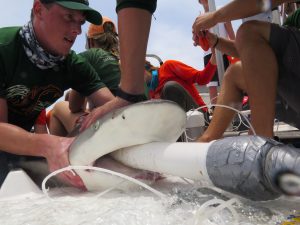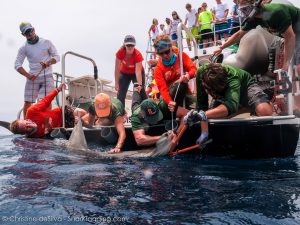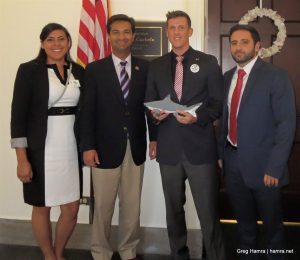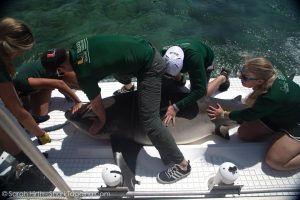Meet Our Team: Stephen Cain
1. What’s your role in the lab?
I’m an outreach coordinator and field scientist. Like many of my labmates I pull double duty, which is a great thing. When I’m speaking with the public, It’s easy for me to relate my passion for sharks, but working in the field really enhanced that for me in ways I didn’t anticipate. I now have lived-in experiences, and vivid images from working with sharks. In my mind’s eye I can trace the cool contours of the hydrodynamic Blacktip or a Great Hammerhead’s cephalofoil. So when I’m speaking to you, as I am now, I’m not speaking to you from a stage or a soapbox. I’m speaking to you from the cerulean colored waters of the Western Atlantic where, at this very moment, sharks roam.
2. Tell us a little about yourself.
I’m from St. Charles, Illinois. From an early age I had an interest in fish—my mom says I was five months old when she noticed that I noticed that fish were cool. When I’m not thinking about sharks I’m chasing sunsets with my camera or cycling underneath the storied Banyan trees of Miami.
3. How did you get interested in marine biology and conservation?
The credit goes to a lot of people, circumstances, dumb luck, and persistence. I still can’t believe that I’m here doing this. Growing up, trips to the John G. Shedd Aquarium in Chicago were significant. I visited the aquarium recently and returned to the Caribbean Reef Exhibit that had so captivated me when I was younger. It was really fun to look at that exhibit anew—I recognized the species on display; I listened as kids explained to their parents what got them excited about it. I think that we all, at some point, want to be marine conservation biologists.
4. What’s your favorite part about working in the lab?
I feel confident in saying that I’ve never worked on a team like this before. There’s a hivemind at work that is awesome to witness. The Rosenstiel School at The University of Miami was an intimidating place when I first started—there is a lot of fascinating research going on here—but I’m well aware that I’m amidst the cream of the crop. These people will make the world a better place, and I can say that I know them.
5. Is there anything you’d like to say to our blog readers?
In light of the recent press coverage on shark attacks, I’d like to share with you something that I’ve spent some time considering. While I’ve loved the ocean my whole life, it wasn’t until recently that I studied it as intensely as I do now. I was reared in the Midwest, accustomed to glacier lakes and freshwater. So it’s safe to say that my comfort level with the ocean has, by degrees, steadily changed as I’ve learned more about it. If there is a kernel of truth to the sensational media coverage surrounding shark attacks, it is this: there is inherent risk when you recreate in the ocean. However, as has been widely discussed, our perceptions of risk when it comes to shark attacks are undeniably irrational. Even so, I can’t say that sharks don’t make me nervous. I have a profound respect for what they can do as predators. As I spend more time learning about them, though, I suspect that may yet change. And if it doesn’t, that’s okay too. Because I don’t think I have to reconcile fear and fascination to know how to do the right thing. Life is not without its risks, and to me a well-considered one builds in enough room to do the things we love while leaving enough room to coexist. Sharks, and the ecosystems they support, are important to human beings, it’s true, but ensuring that they persist alongside us is just something we ought to do.




